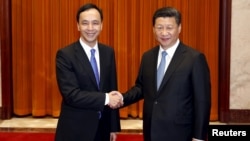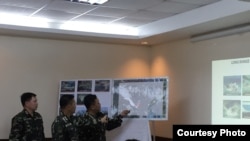Top political leaders from Taiwan and China met for the first time in six years Monday, and held talks that analysts say are aimed at boosting support for the island’s ruling party ahead of key elections early next year. A key message Nationalist Party Chairman Eric Chu had for China was a call for more economic opportunities for Taiwan’s younger generation.
Chu’s first visit to China is a significant one. Not only because it has been more than half a decade since the heads of the two parties have met, but also because Chu is a likely candidate in Taiwan’s next presidential election.
Chu arrived in China for the three-day visit on Saturday. The trip has included meetings with ranking Communist Party leaders, a forum between the Nationalist Party and Communist Party as well as casual discussions with scholars and students at universities in Beijing and Shanghai.
On Monday, when Chu met with Communist Party chief Xi Jinping, he called for more participation for Taiwan in efforts aimed at promoting regional integration.
Chu says, “the younger generation in Taiwan hopes to see the promotion of regional peace, no matter what the activities or organizations might be.” He says that “includes efforts that seek to promote regional economic integration such as the Asian Infrastructure Investment Bank and ‘one belt, one road.’”
During his visit, Chu repeated Taiwan’s request to join China’s multi-billion dollar infrastructure bank. China claims that Taiwan is part of its own territory and has concerns about the island joining the bank using a name that might imply it is an independent country.
During their meeting, Xi Jinping pledged bigger efforts to benefit those in Taiwan, including giving the island priority as China continues to open up its economy.
Xi also told Chu that the two should resolve their political differences by holding talks on equal footing. Adding, however, that such talks could only take place if the self-ruled island accepts it is a part of China.
The communists defeated the nationalists in 1949 during a civil war in China, which forced them to flee to Taiwan. The meeting between the two party leaders is the third since that split occurred and first since 2009. It comes at a crucial time for the ruling Nationalist Party, whose political support in Taiwan is slipping – even as it has promoted closer ties with China.
Political scientist Joseph Cheng from the City University of Hong Kong says that while the visit has its risks for Chu and the ruling Nationalist Party, or KMT, China is likely to find ways to offer its former rival support.
“The KMT can certainly count on some support from the Chinese relationship, and in this particular case, Taiwan's participation in the AIIB, may be the kind of concession,” Cheng said.
Since the Nationalist Party was voted back into office in 2008, it has staked much of its success on improving ties with the island’s big neighbor, China. Since then, the two parties have signed a flurry of economic agreements.
But, a massive protest led by students last year, which saw the occupation of the island’s legislature in boycott of a trade deal with China, has mobilized Taiwan’s younger voters and raised a wide range of concerns about the benefits the island is reaping from closer ties with China.
Not long after that in November, the Nationalist Party suffered a major setback during local elections, losing eight seats, including the capital of Taipei City, a longtime stronghold.
Taiwan’s ruling Nationalists have yet to select a candidate for the race. But many feel Chu has the best chance of winning the presidential elections. Chu, who was re-elected last fall as the head of Taiwan’s biggest city says he will not leave his post to run for president.





